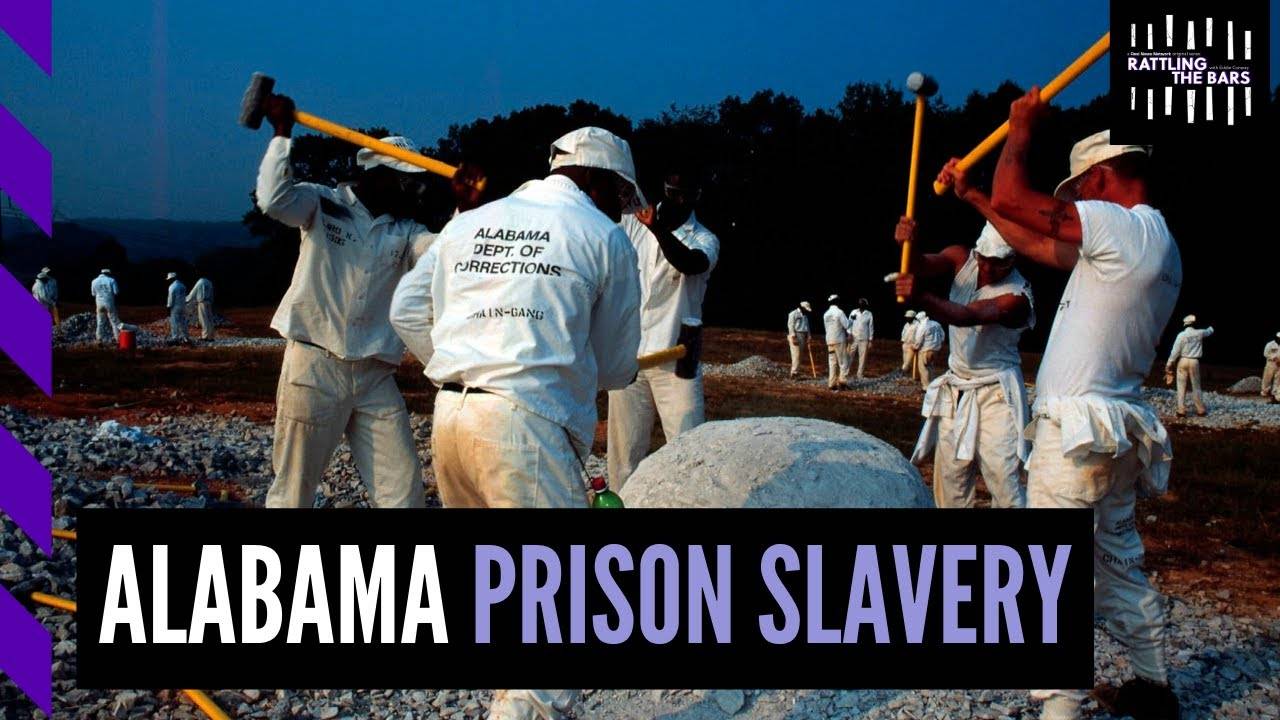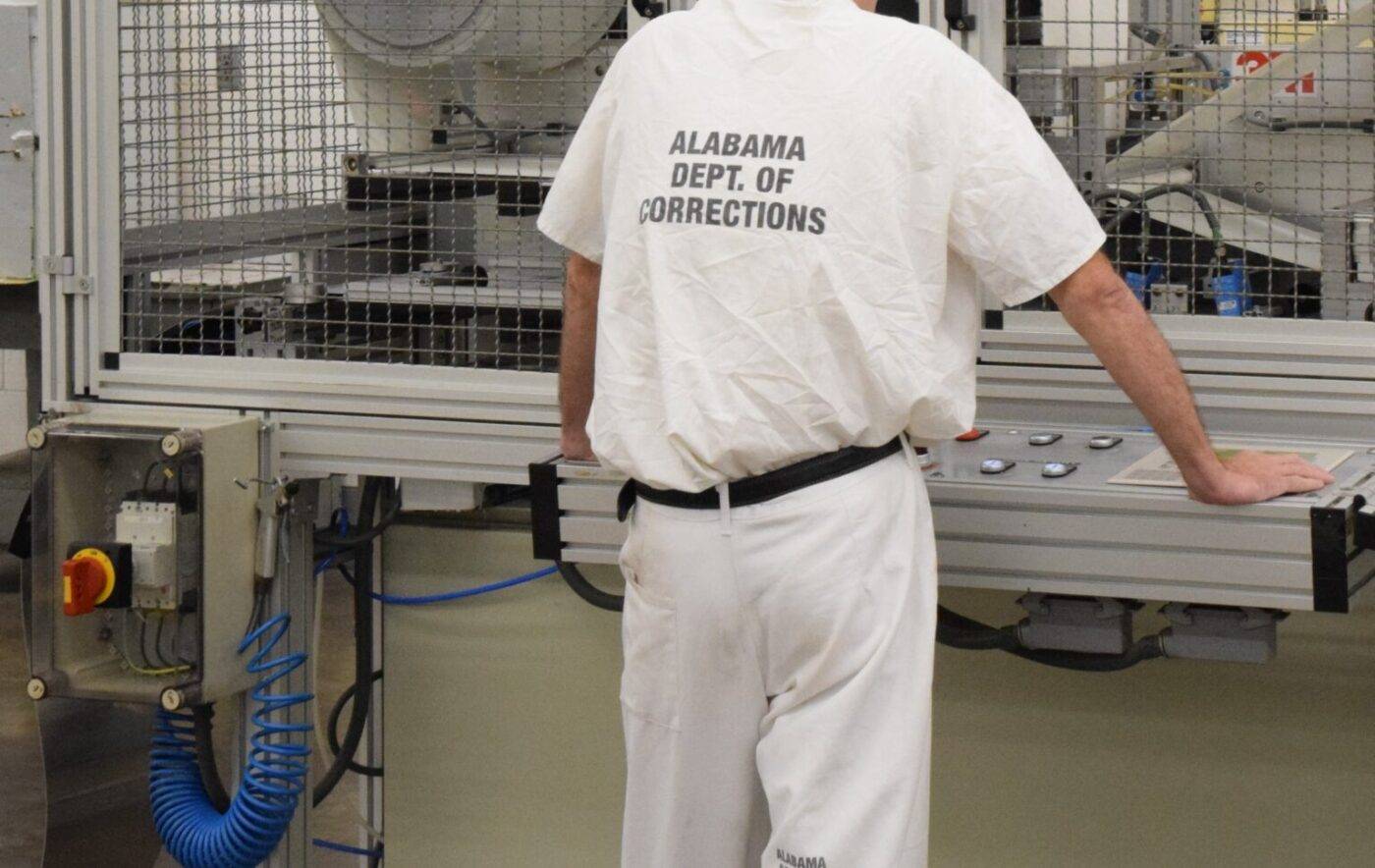
Suit challenges constitutionality of government actions to punish resistance to forced labor among majority-Black prison population
by the Center for Constitutional Rights
Montgomery, Ala. – On International Workers’ Day, six incarcerated people brought a state court lawsuit against Alabama Gov. Kay Ivey and Alabama Department of Corrections (ADOC) Commissioner John Hamm with the goal of abolishing involuntary servitude in the state’s prisons. They are asking a state court to declare that recently enacted state laws and policies violate the state constitution, which, as of only two years ago, makes slavery and involuntary servitude illegal in prison.
A notorious prison system, Alabama’s is the most overcrowded in the country, operating at over 168% capacity, and, while Black people make up 26% of the state population, they account for 53% of the prison population. Until the fall of 2022, Alabama still permitted slavery and involuntary servitude in prisons, exploiting an infamous loophole in the Alabama Constitution and the 13th Amendment to the U.S. Constitution. But following a successful labor strike by incarcerated workers, Alabama voters approved an amendment to the state constitution that expanded the ban on slavery and involuntary servitude to prison. With their state court lawsuit – the first of its kind – the plaintiffs seek enforcement of the amendment.

In response to the labor strike, the state implemented three laws that authorize punishment for incarcerated people who resist forced labor: Gov. Ivey’s Executive Order No. 725, ADOC Revised Administrative Regulation 403, and revisions to Section 14-9-41 of the Alabama Code. This lawsuit challenges those two executive actions and Section 14-9-41 – all of which prohibit incarcerated workers from refusing to work and authorize punishment for such refusal.
People incarcerated by ADOC are routinely punished or threatened with punishment for declining to work; such punishment can include loss of earned good time credit, solitary confinement, transfer to a higher-security (and more violent) prison and loss of contact with loved ones.
“We chose to file this case on May 1, in solidarity with workers around the world, because ending forced prison labor in ADOC isn’t just about stopping the state’s extractive profiteering from the labor of Black people – both inside and outside of prisons. It’s also about eliminating the control that forced prison labor enables the state to exercise over Black people – an extension of the control exerted by the state through slavery, the Black Codes, convict leasing and Jim Crow,” said CJ Sandley, staff attorney at the Center for Constitutional Rights, which represents the workers through its Southern Regional Office.
The six plaintiffs –Trayveka Stanley, Reginald Burrell, Dexter Avery, Charlie Gray, Melvin Pringle and Ranquel Smith – have all been punished or threatened with punishment for resisting forced work. The lawsuit requests a court order to stop the defendants and their agents from subjecting them to forced prison labor and involuntary servitude, or threats of forced prison labor and involuntary servitude, for not working or refusing to work, and to declare certain state legal measures authorizing such actions unconstitutional. Their suit also asks the court to expunge from their records any relevant disciplinary reports and behavior citations issued after Nov. 28, 2022, when the new constitution was ratified.
“I am motivated by my passion to fight for an end to all injustice. That passion burns brighter than my fears. We must stand for something or we will fall for anything. This lawsuit is about the unpaid, overbearing state jobs that I, as well as my fellow inmates, are being forced to work against our will. According to Article I, Section 32, this is against the law,” says Plaintiff Trayveka Stanley, currently incarcerated at Montgomery Women’s Facility in Montgomery, Alabama.
According to Plaintiff Reginald Burrell, who is incarcerated at Decatur Work Release in Decatur, Alabama: “The most influential public officials in the state of Alabama today remain loyal to and act in unity with their racist slave legacy from the Confederacy and the Jim Crow era, continuing to deliberately make, enforce and defend bad policy decisions and practices, knowing it results in the demise, disadvantages and disenfranchisement of poor whites and African-Americans, perpetuating hopelessness, despair and excessive suffering in our lives today and knowing it induces, in many circumstances, desperate choices under duress, to give themselves reason to enslave us through incarceration by the Alabama Department of Corrections for the sole purpose of continuing forced labor, slavery and involuntary servitude in this state.”
Currently incarcerated at Elmore Correctional Facility, Plaintiff Ranquel Smith said of ADOC’s system of forced labor, “Being at work release can get stressful sometimes. I fully understand that at work release you get a little freedom, such as working a free world job, taking home passes and much more, but all that can be taken away so fast by refusing to work a job that’s not fit for you or not in your best interest. You will receive a disciplinary write-up and/or have good time taken away. To me, that’s not being treated fairly at all.”
Alabama is one of several states to join the growing movement to abolish prison slavery and involuntary servitude at the state and federal level. Voters in Colorado, Nebraska, Oregon, Tennessee, Utah and Vermont have approved similar changes to their states’ constitutions to remove the loophole permitting slavery as a form of punishment for incarcerated people.
With a strategic Southern Regional Office centered in Jackson, Mississippi, the Center for Constitutional Rights’ Southern Justice Rising initiative represents our deepened, renewed institutional commitment to liberatory movements in the Southern states like Alabama. We have worked closely with generations of Southern freedom fighters and continue that historical work by partnering with Southern grassroots movements, human rights defenders and community organizations fighting to transform material conditions, dismantle systems of oppression and advance visions of collective liberation today.
The Center for Constitutional Rights works with communities under threat to fight for justice and liberation through litigation, advocacy and strategic communications. Since 1966, the Center for Constitutional Rights has taken on oppressive systems of power, including structural racism, gender oppression, economic inequity and governmental overreach. Learn more at ccrjustice.org.
Inmates challenge motion to dismiss in Alabama forced labor federal lawsuit
Incarcerated individuals in Alabama have filed a 214-page response opposing a motion to dismiss their lawsuit accusing state prisons of using slave labor.
The case involves multiple claims against state officials, private employers and local governments alleging Alabama’s prison labor program system is a form of modern-day slavery. Each defendant filed motions to dismiss the lawsuit, claiming that counsel for plaintiffs did not state a legal claim in the lawsuit.
“Despite Defendants’ strenuous efforts to dispute Plaintiffs’ well-founded allegations – a strategy that cannot justify dismissal of Plaintiffs’ claims at this juncture – and to preclude the Court from evaluating the sufficiency of Plaintiffs’ claims on the merits, Plaintiffs have stated viable claims against all Defendants, and the motions to dismiss should be denied,” counsel for the plaintiff wrote in the response to defendants’ motions to dismiss.
Defendants argued in their motion to dismiss that plaintiffs failed to “exhaust administrative remedies” under the Prison Litigation Reform Act (PLRA), meaning inmates must try to resolve their complaint through the prison’s grievances procedures.
Plaintiffs argue that the PLRA does not bar their claims under the Trafficking Victims Protection Act (TVPA), the Racketeer Influenced and Corrupt Organizations Act (RICO), and the First Amendment because their claims, rooted in federal law, fall outside the limits of the PLRA, which limits federal court authority over state law compliance.
The inmates claim they were coerced into labor through threats and physical restraint, arguing that state officials and employers benefited from this forced labor in violation of the TVPA. They refute arguments that the TVPA does not apply to state actors and maintain their right to bring these claims.
“The TVPA is written broadly to address trafficking wherever and by whomever it may occur, making clear that Congress did not intend to offer a safe harbor to those who engage in trafficking,” lawyers for plaintiffs stated in the filing.
The plaintiffs also allege a pattern of racketeering activity under RICO, involving forced labor practices. They provide detailed allegations against each defendant “by forming and maintaining a labor-trafficking enterprise for the purpose of benefiting from the unlawful forced labor of Coerced Labor Individual Plaintiffs and other incarcerated workers.”
State constitutional claims are also made, with plaintiffs seeking injunctive relief against local governments and private employers. They argue that parole policies violate the Ex Post Facto Clause by retroactively increasing punishment.
Racial discrimination claims under the Equal Protection Clause are also included, alleging that Black parole candidates were treated less favorably than white counterparts.
Substantive due process rights, the KKK Act, and First Amendment violations are also included in the filing. Plaintiffs claimed that state officials used arbitrary power and retaliated against inmates for speaking out against prison conditions. They also claim some defendants financially benefited from illegal labor practices without fair compensation to the workers.
Defendants have until July 31 to respond, after which time the judge will decide whether the case is dismissed.
This story originally appeared in the Alabama Reflector, at https://alabamareflector.com/2024/06/10/inmates-challenge-motion-to-dismiss-in-alabama-forced-labor-federal-lawsuit/ .





